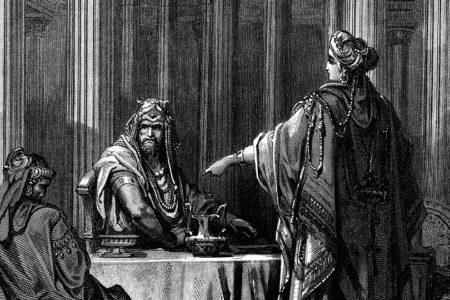The Truth About Who Killed Christ
Jewish people have been murdered, vilified, and hated for centuries as “Christ-killers.” Did they kill Christ? Here is what the Bible teaches.
A few months ago, I met with a high-profile Jewish leader who was giving a talk about his journey from poverty to entrepreneurial success. As a boy growing up in the slums of Boston, he said he was often chased down and beaten up by Gentile kids in his multi-ethnic neighborhood.
One day, after receiving another routine pummeling, he turned to his assailants and pleaded, “Why do you hate me? What have I done to you?”
The boys replied with a sneer, as if the answer were obvious: “Because you killed Christ!”
Sadly, this man’s experience is far from unique. For Jewish people, this sort of treatment—and much worse—has been the norm for centuries. Unfortunately, it is rooted in theological ignorance and an all-too-willing disposition to hate.
In the 800s, for example, French Christians began a custom of harassing Jewish people on Easter. In one city, they threw stones at their Jewish neighbors each Palm Sunday. In another, religious leaders would force a Jewish man to stand in the town square and be slapped in the face during the Easter holiday. A historian recorded that one man “was struck so hard that he died of a fractured skull.”1
Perhaps the most notable anti-Semites were the Crusaders, whose aim was to liberate Jerusalem from the “infidel” Muslims and Jews. Prior to leaving France for the Holy Land, Duke Godfrey of Bouillon declared he would “avenge the blood of Jesus by leaving ‘no member of the Jewish race alive.’”2
On July 8, 1099, Godfrey and his men arrived in the Holy City. When the Muslim governor refused to surrender unconditionally, Godfrey besieged the city. At the end of a week-long standoff, he and his men broke through Jerusalem’s walls and killed as many people as they could.3
A historian recorded the Crusaders “herded 6,000 Jews into a huge synagogue and then set fire to the building.”4 While burning the Jews alive, some Crusaders reportedly sang the hymn “Christ, We Adore Thee.”5
These are merely a few examples of the horrendous damage done by the theological lie that the Jewish people killed Christ. Who did kill Jesus? The answer is multifaceted. On the one hand, a segment of Jerusalem’s Jewish population was complicit in Jesus’ death. But so were the Gentiles, so were you, and so was I. And in yet another sense, nobody killed Jesus.
The Jewish People
Many who blame the Jewish people for Christ’s death often point to Matthew 27:25 as evidence: After Pontius Pilate washed his hands and declared his innocence “of the blood of this just Person [Jesus]” (v. 24), Scripture says “all the people answered and said,‘His blood be on us and on our children’” (v. 25).
However, people who use these verses fail to consider the context. Did the entire nation of Israel call for Jesus’ death? Of course not.
First, not all the Jewish people alive at the time lived in Jerusalem, and it was only people in Jerusalem who called for Jesus’ death.
Second, it was the Jewish leaders who orchestrated the crucifixion, not the general public. As Jewry’s spiritual and political representatives, they knew the prophecies of the coming Messiah better than anyone. They should have led the nation in repentance and acceptance of its promised King. Instead, they led a revolt against Him.
Reading Matthew 27 in context reveals that, when Pilate offered the crowd the option of releasing from prison either Jesus or Barabbas, it was “the chief priests and elders” who “persuaded the multitudes that they should ask for Barabbas and destroy Jesus” (v. 20).
In fact, throughout Jesus’ ministry, the vast majority of people who accepted His message were Jewish. Some Gentiles became believers; but Jesus focused primarily on taking His message to His own people, Israel; and thousands of them believed in Him.
Theologically and historically, it is highly inaccurate to say the Jewish people as a whole killed Jesus.
The Gentiles
Then we come to the rest of the human population: the Gentiles. How quick many are to blame the Jews for Christ’s death without leveling any charges against the Gentiles.
I have been to the Church of the Holy Sepulchre in Jerusalem—the supposed site of Jesus’ death, burial, and resurrection. Whenever I’m there, I stop to look at the church wall that displays an ancient mural depicting Jesus being nailed to the cross. He is lying on the ground. A woman, presumably Mary, is weeping at His feet. Standing piously by the Lord’s side is a dark-garbed Roman saint, mourning the crucifixion taking place; and near Jesus’ head, hammer and spike in hand, is a Jewish man who has evidently just nailed Jesus to the cross.
Though the use of murals in churches today is rare, at least among evangelicals, these paintings were once the primary means of teaching the Bible to a generally illiterate public. For those who “read” this mural, the message was clear: The Jews killed Jesus. The Romans are innocent. The New Testament, however, tells a different story.
Pontius Pilate, the Roman governor of Judea, ordered Jesus scourged and then crucified, despite finding Him innocent of all wrongdoing. It was this Gentile governor who sentenced Jesus to death. It was the Gentile Roman soldiers who stripped Jesus of His clothes and mocked Him. Gentile soldiers spat on Him, struck Him on the head, nailed Him to the cross, and speared His side to ensure He was dead.
By no means are Gentiles innocent of Jesus’ murder. If we are going to blame someone, we must also blame the Gentiles.
You and me
It is tempting for us in the 21st century to engage in what C. S. Lewis called “chronological snobbery.” We think people in Jesus’ day were backward and uncivilized and that we would never kill the Lord today. The problem is, we have already killed Him.
The Jewish Scriptures prophesied the Messiah would die for the sins of others (Is. 53:4–6; Dan. 9:26). The apostle Paul confirmed the Scripture when he wrote, “For He made Him who knew no sin to be sin for us, that we might become the righteousness of God in Him” (2 Cor. 5:21), a message echoed by the apostle John: “He Himself is the propitiation for our sins, and not for ours only but also for the whole world” (1 Jn. 2:2).
Our sin today necessitated Jesus’ death on the cross. He had no sin of His own (Heb. 4:15). He was the perfect, sinless “Lamb of God who takes away the sin of the world!” (Jn. 1:29). Our sin and that of all humanity throughout the ages necessitated the atoning sacrifice of Israel’s Messiah—mankind’s Savior—the “Lamb slain from the foundation of the world” (Rev. 13:8). His death and resurrection were part of God’s plan of redemption before the world began.
No One
Consequently, it is theologically accurate to say no one killed Jesus.
Jesus Himself said, “No one takes [My life] from Me, but I lay it down of Myself. I have power to lay it down, and I have power to take it again. This command I have received from My Father” (Jn. 10:18).
When Pilate declared, “I have power to crucify You, and power to release You” (19:10), Jesus replied, “You could have no power at all against Me unless it had been given you from above” (v. 11). As Scripture tells us, “being found in appearance as a man, He humbled Himself and became obedient to the point of death, even the death of the cross” (Phil. 2:8); and He did it for us.
Jesus gave His life freely so we may receive forgiveness of sin and “dwell in the house of the LORD forever,” as King David said (Ps. 23:6). That fact ought to cause us to cease blaming others for Jesus’ death and bow our heads in grateful humility that we have a Savior who loves us.
ENDNOTES
-
-
- Phyllis Goldstein, A Convenient Hatred: The History of Antisemitism (Brookline, MA: Facing History and Ourselves National Foundation, 2012), 58–59.
- Ibid., 70.
- Ibid.
- Ibid.
- Anthony J. Sciolino, The Holocaust, the Church, and the Law of Unintended Consequences (Bloomington, IN: iUniverse, 2012), 31, n 81.
-









Thanks, Ty
That’s the conclusion I have reached in my study of John’s Gospel. There seem to be few who have dug deep enough into the Scriptures to draw that conclusion. I appreciate the way you presented it – encouraging your readers to reconsider their views in the light of the Scriptures. I’ve made a copy of your article for my files. God bless.
Awesome article. Thank you….causes me to dig into and read every Scripture verse listed. Equips me to converse with others intelligently.
No, it is not theologically accurate to say “no one killed Jesus.” In John 10:18, Jesus was not saying that no one would kill him (obviously). Rather, he was saying that no one has the ultimate power to take his life. Both Jews and Gentiles killed Jesus only because Jesus laid down his life voluntary according to the predestined will of God, “…for truly in this city there were gathered together against your holy servant Jesus, whom you anointed, both Herod and Pontius Pilate, along with the Gentiles and the peoples of Israel, to do whatever your hand and your plan had predestined to take place.” Acts 4:26-27
According to the apostles, the Jewish people, along with the Gentiles, shared responsibility in crucifying the Messiah. But it was all done according to God’s predestined will.
None of which gives us the right to persecute Jewish people today.
And yes this kind of false statement is why all the lies keep going on and on my friends we all crucified Christ every time we sin we scream out crucify Hm it was because we all were sinners and needed a savior for our salvation comes through Christ and Christ alone that is what the Word of God teaches from the beginning to end let us all humble ourselves and repent and come and bow down at the feet of Christ for we our running out of time and start teaching and preaching the true gospel of our Lord and Savior
Thank you!
Excellent article!!!
Much needed.
I share this in my prison ministry.
I have also shared this with some friends, Israel, Hungary, other…
Unfortunately most people do not read the Bible and believe the lie.